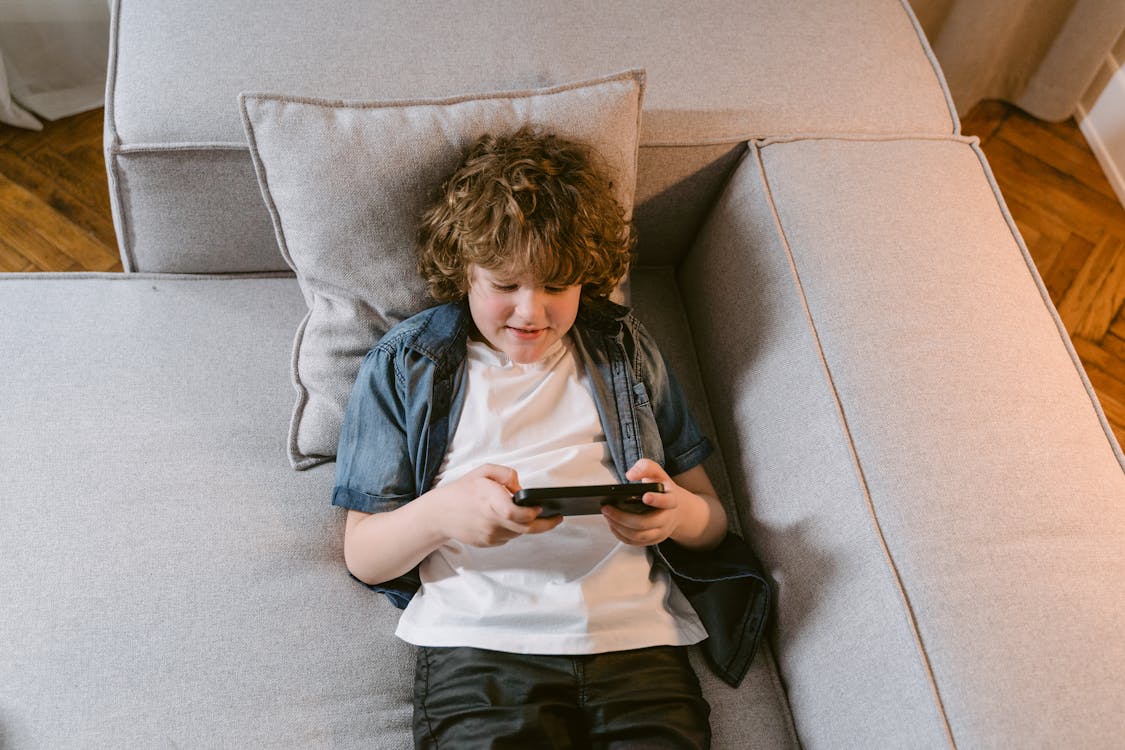
In the spring of…I almost typed 2012, but nope let’s travel a decade further…
In the spring of 2002, I sat in my grandpa’s living room floor, surrounded by family as I unwrapped a birthday gift that would make any 12-year-old lose their mind in the best possible way. I was holding my very own Nokia 5110 with the interchangeable face plate. It came in blue, but I remember having a couple of different vibrant colors. I could call, text using the T9 Word method, and of course, play snake. Words could not describe the excitement that filled my little heart as I listened to each ringtone in its entirety trying to pick the best one. I feel for my parents and their poor nerves. I still have that phone, in my Nokia collection.
Did this take you back to when you first got a cell phone?
I’m not sure about you, but I can appreciate the simplicity of my Nokia. Even my very basic (but trendy) non-smart phone, was a privilege to have and was heavily monitored. As a teenager, I recall being grounded from my phone at times. The last time I was grounded from my phone was when I was 17-years-old. I’ll never forget, thinking I had it figured out, when I went to the old Walmart and purchased a Tracfone. I bought minutes for talking and texting with my friends. This worked for about a week, until my sister nonchalantly mentioned it to my dad. The same day she ratted me out, he removed me from the family plan, and I was solely responsible for my cell phone bill moving forward. This was a lesson I will never forget.
We can all agree that 2024 is not the same as the early 2000s.
The world is ever-evolving and this simply isn’t the same world you and I grew up in. I, for one, am thankful smart phones weren’t a thing when I was a kid/teenager. This might get me classified me as crunchy-millennial mom, but until my divorce almost two years ago, screens weren’t something you’d see in front of my children with the exception of a few movies and Nintendo 64.
I understand this is likely an unpopular opinion and that others do not share this view. If you’re one of those people, it is completely okay. We all must do what works best for our family. Not everyone parents the same and that is okay too. Please hear my heart: there is no judgment from me if screens are a regular part of your child’s day. Based on my personal experiences with my children however, my kids function better when they don’t get screen time. Instead of turning on a screen, when the kids are home, they play games, enjoy time outside, read, roughhouse, do arts and crafts, and have time for boredom. When we are in public, at a doctor’s office or restaurant waiting, we will play “eye spy” or I simply work to teach the kids the importance of being patient and waiting their turn.
When the kids began living in two homes, things changed in various ways, specifically technology and screen time.
t was a major adjustment for my kids because one home maintained their routine, limiting screen time on a consistent basis, the other not so much. They began spending more time playing video games and discovered YouTube. It’s not been an easy experience trying to counterbalance the time they spend in front of a screen as it’s an ongoing challenge. You can imagine the shock that commenced in February of this year, when the boys (ages 10 and 11) were told that they had each just gotten new iPhone. They were overjoyed to say the least. Those big smiles took me back to the enthusiasm I felt in the spring of 2002. It didn’t take long for all the thoughts and logistics of how to shield my children from the internet, strangers, and the world, to overshadow the excitement. With a split household, the challenges of maintaining continuity over monitoring the devices proved to be too much. It caused worry and great difficulty navigating this new world of screens, not just at their dad’s house, but in our home too.
While there have been plenty of studies on kids and phones, we can all list pros and cons when it comes to giving our children a phone. For some, it may be the comfort of being able to pinpoint their child’s location using GPS, the accessibility to the child, a way to keep their child entertained…the list could go on depending on your circumstances.
But do the positives outweigh the cons? Do all the pros outweigh the consequences of handing a smart device to your child, in essence, giving them access to the world at their fingertips? And giving the world immense access to them?
The first week my kids came home after receiving their phones, we discussed how the phones should be handled and established guidelines. In some ways, we met in the middle. For example, we compromised on how much time they were allowed during the day, when the phones were available to them, and whether they would take their phones with them when we left the house. Then there were some non-negotiables too. For examples, the phones had to be turned off by a certain time, phones had to be used in the common areas of the home, phones should be left in my room at night, and I would regularly monitor them. The kids weren’t keen on the guidelines initially, but eventually adjusted — somewhat. Regardless of their compliance, there was a definitive shift in their demeanors.
It didn’t take long for our home to grow eerily quiet.
Silence filled the space where conversations, laughter, and quarrels once lived. It was common for the boys to be on the couch with their siblings curled up beside them, watching them play a game or watch a video. The pitter-patter of bare feet wasn’t heard running through the house, the doors weren’t being slammed as kids ran in and out, toys weren’t on the floor, and kids weren’t complaining of boredom and I actually had a minute to myself.
I’ll pause to acknowledge that all of it sounds nice as a single mom…it would be so easy to look the other way. The distraction of the device could effortlessly be a go-to, selfishly providing me a little break. But, I couldn’t hear the pitter-patter of feet because they were curled up somewhere with their phone; the doors weren’t being slammed because they weren’t being opened; toys weren’t on the floor because they weren’t being played with; and my kids didn’t experience boredom because they weren’t bored at all…nothing else mattered when the screen was nearby.
The four months my kids had their phones were some of the most heart-wrenching experiences I’ve ever faced.
When they woke up before school, they would get dressed quickly to make sure they had time to sit on the couch and stare at their phones. In the car, I would look back in my rearview mirror to see their precious little eyes glued to their screen. As they would walk, their heads would be down. They were dependent on their device. Despite our established screen time rule, they continuously requested more and more — it was never enough. They begged for ways to earn additional screen time and constantly pleaded to keep their phones in their room at night. This was an increasing concern. Additionally, when monitoring their phones, I’d see inappropriate content being promoted. This is when I began drawing the line. Despite my best efforts to enforce parental controls, there was nothing I could do to protect my children.
So, how do I fight this fight? How do I step up and do what is right, especially knowing how much they do not like it when I take their phones?
Here, I had to remind myself repeatedly that as my children’s mother, I am their protector. At this age, children lack the judgment and maturity to make completely informed decisions that are in their best interests. Children’s brains are still developing, particularly the prefrontal cortex which is responsible for decision-making, impulse control, and understanding long-term consequences. As a result, children can be prone to risky, impulsive, or short-sighted decisions. They may not fully understand compound topics like health, safety, and the consequences of their choices. Making important decisions requires careful consideration that many children have not yet developed.
Witnessing their mental well-being at risk, I began limiting access to the phones entirely. They didn’t understand why the rules were vastly different between households and how I could limit something their dad had purchased. Rightfully so, it was a lot to comprehend, even as an adult. Even when I reduced their screen time, just the possibility of having the phone caused tension, depending on the circumstances. Thankfully, in my attempt to solve this problem, a judge who could relate, stated that at this age, phones are for communication purposes, not entertainment, and decided their phones should be taken.
I’ve talked with other moms who defeatedly admit they regret buying their children phones. But here’s the thing: as their parent, you have the right to restrict or even remove a phone from your child’s life. You’re their parent, the adult put in place to guide, protect, and care for them until they are grown. My boys haven’t had their phones in two months and they are completely different — in such a good way. We openly talked about the reasons why we don’t have phones anymore and explained that it’s for their protection. Occasionally, they still ask about getting a phone one day and complain that they aren’t happy with me…I am okay with taking the blame on this one. I stand firm that this was in their best interest.
My oldest son’s birthday is coming up and he will be entering middle school. He has proven responsibility, so I am considering getting a Bark phone for him…or better yet, do you think AT&T would activate one of the old phones from the early 2000s I have in storage? I’m only kidding — kind of — those phones were durable. Which non-smart phone do you have for your middle schooler? Suggestions are greatly appreciated!





















